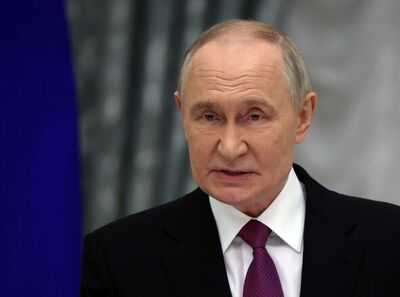Russia has threatened to send hypersonic missiles to Venezuela in a major move against US President Donald Trump. Amid rising tensions over the significant US military presence in the Caribbean, a senior Russian MP suggested Moscow may send hypersonic missiles to help defend the country, run by President Nicolas Maduro.
Alexei Zhuravlyov, the deputy chairman of Russia's parliamentary defence committee, told Russian state media: "I see no obstacles to supplying a friendly country with new [weapon] developments such as the Oreshnik." The Kremlin has claimed the nuclear-capable Oreshnik missile, which means "hazel tree" in Russian, is impossible to intercept and can carry conventional and nuclear warheads. It is an intermediate-range ballistic missile that travels at hypersonic speeds.
He also said that Moscow could provide Caracas with Kalibr cruise missiles, and warned that "the Americans may be in for some surprises".
The US military presence in the Caribbean is its largest since the Cuban Missile Crisis of 1962, which brought the world to the brink of nuclear war.
President Trump has accused Maduro of facilitating drug smuggling to the United States and Washington has offered a $50 million reward for his arrest.
The US has ordered warships, warplanes, marines, drones and spy planes off the coast of Venezuela. However, Trump said last week he was not planning attacks against Venezuelan territory.
"The unjustified build-up of American forces in the southern Caribbean is creating a situation of heightened tension, and no one but the United States itself is to blame," said Sergey Rybakov, a Russian deputy foreign minister.
US strikes have already killed more than 60 people in the Caribbean, whom Washington claimed were drug smugglers, reports The Times. Trump also authorised the CIA to conduct covert actions in Venezuela.
Maduro, who has ruled Venezuela for more than a decade since 2013, accused Donald Trump of "fabricating a war", and claimed he was in daily talks with Russia, which included military matters.
He claimed that Washington's true goal is to seize Venezuela's oil reserves, and in response to the US military presence, Venezuela had deployed 5,000 Russian-sourced surface-to-air missiles.
He said the Igla-S portable missiles were placed across the country, "from the most remote mountain to the most remote village, to the most remote city".
In May, Russia and Venezuela signed a strategic partnership deal, which agreed a "military-technical" co-operation between the two countries, although it does not include a mutual defence pact.
The lethal Oreshnik missile referenced by Zhuravlyov was used for the first and only time last year by Russia, which fired it at a factory in Dnipro, Ukraine. President Zelensky said last week that it has a range of just over 3,000 miles.
A Russian Ilyushin Il-76 freight aircraft, capable of carrying up to 50 tonnes of equipment, landed in the capital of Caracas late last month. Its cargo was unclear.
The aircraft belonged to the Russian government-affiliated Aviacon Zitotrans, which has been sanctioned by the United States.
Russia also said in July that it would open a Kalashnikov weapons factory in Maracay, Venezuela, to produce AK assault rifles for the Venezuelan army and security forces.
However, analysts believed that with Russian troops fighting in Ukraine, Putin is unlikely to seek a direct confrontation with the United States over Venezuela.
Russia also has a strategic partnership deal with Iran, but Moscow did not counter strike when Trump ordered strikes against Tehran's nuclear facilities in June.
Maduro's presidency has been marred by controversy, with the first half of his presidency seeing the opposition launch a united effort to remove him from office, which failed.
He has been accused of undermining democracy, and organisations such as Amnesty International have highlighted human rights violations.
As of December 2024, more than 7.8 million people had fled Venezuela due to dire shortages of food, medicine, and other necessities, making it one of the largest external displacement crises in the world, according to World Vision.
Once one of the wealthiest nations in Latin America, Venezuela's economy collapsed after a sharp drop in global oil prices and a steep decline in domestic oil production, and suffered years of hyperinflation.
You may also like

BBC under fire again as it removes article suggesting insurance companies were racist

PM Modi to inaugurate National Conference on 'Strengthening Legal Aid Delivery Mechanisms' on Nov 8

Meghan Markle mocked after latest Hollywood 'headline grab'

Aston Villa vs Maccabi Tel Aviv LIVE: Birmingham chaos as fans and Gaza protesters clash

Royal fans all say the same thing about Meghan Markle's return to acting







